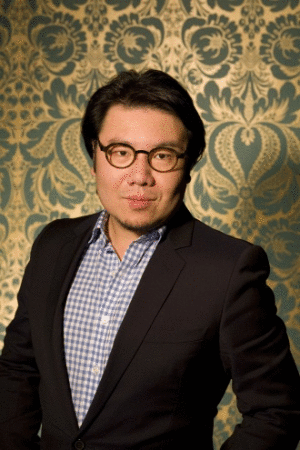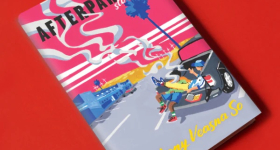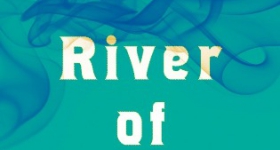Kevin Kwan’s Crazy Rich Asians’ (Double Day) pink font glitter-gold cover makes some big promises. It promises to be outlandish, fabulous, and definitely not “serious literature"--and I wouldn’t want it any other way.
The novel starts off with Nicholas Young asking his girlfriend Rachel Chu to spend the summer in Singapore with him, a trip during which she’ll inevitably meet his family. This sets off signals for Rachel. She and Nick have been dating for two years and he wants her to meet his family. Does this mean he’ll pop the question? The only thing Rachel doesn’t know yet is that her sweet, unassuming, untenured-professor boyfriend Nick is the most eligible bachelor in Asia. All of the most crafty mothers in Singapore are already pushing their daughters to snatch him up before this nobody, Rachel Chu from Sunnyvale, lands the biggest catch in the Eastern hemisphere. Nick’s family is like the Asian equivalent of the Rockefellers. No, I take that back. They’re waaay richer than Rockefellers.
Crazy Rich Asians has all the elements of a soap opera--the insular, petty, back-stabbing relationships of the ultra-rich, overblown descriptions of the Asian old money and glitterati set--but the novel is actually a romantic comedy masquerading as soap opera. It has the typical rom-com elements like the relatable “nice” main couple, the side character BFFs who offer the right support and reflection to our two heroes, the scheming comic piranhas trying to break the two apart, the unearthed secret that threatens to devastate their relationship, and the journey we take to see how the couple surmounts these obstacles.
There’s even the archetypal grand gesture--running to the airport gates just as your lover is boarding, holding a stereo outside a window blasting Peter Gabriel, or putting your life in danger by climbing something tall--except in this book it’s done crazy rich Asian style. Think private jets. In predictable rom-com fashion, Kwan gives you a happy ending but the fun is in how you get there. Readers get an exclusive (and hilarious) peek into the lives of the nouveau riche who design their houses like “baroque-on-crack” and also into the lives of the old money who are so rich that their stately, highly secure manor houses aren’t searchable on Google Maps. It’s no wonder that Ivanhoe Pictures has already purchased the rights to the book and it will soon be a movie. I can’t wait to see the wedding of Colin and his supermodel girlfriend Araminta, which is probably the most over the top event I ever have or will read about.
Other reviewers have lauded this book because it is no Joy Luck Club. It doesn’t offer a hardworking immigrant narrative or second generation angst. But can we please talk about Asian American literature without comparing it to The Joy Luck Club? In an interview with Reuters, author Kevin Kwan explains, “The difference also is these characters happen to be Asians living in Asia, so they don't have the same baggage that I think Asian Americans would have, growing up minorities in a majority culture.”

The author Kevin Kwan, photo by Alexis Rodriguez-Duarte
In fact, the book’s inquiry into race is fairly cursory. There are two instances when the characters are being discriminated against because they are Asian but their bank accounts immediately solve any hindrances for them. In a flashback involving Nick’s cousin Astrid, she is taken to Paris for a couture shopping trip by her ultra-rich boyfriend Charlie Wu and they are snubbed by the shopkeeper and salesgirl. A phone call to Charlie’s banker reduces the shop keeper and salesgirl to groveling servants. Charlie tells Astrid, “As my father always says, the only way to get these ang mor gau sai* to respect you is to smack them in the face with your dua lan chiao** money until they get on their knees.” It’s refreshing that these characters can live as they are without the “baggage” of being racial minorities but it also serves as a reminder that money often trumps race, a luxury many of us don’t have.
But the rich are not without their problems, and money causes plenty of strife. Nick’s cousin Astrid’s rocky marriage to a middle-class husband foreshadows a possible future for Nick and Rachel. Nick’s other cousin Eddie is so obsessed with keeping up with his rich mainland Chinese friends that his family becomes long time sufferers of his emotional abuse. Nick’s childhood friend Colin battles with depression because his entire life has been arranged for him. Kwan allows a bit of moralizing here, but besides a few biting footnotes, he doesn’t do too much of it. He lets the screeching cattiness, the snobbery, and the gossipy hypocritical Chinese aunties speak for themselves.
Despite the somewhat artificial dialogue, the romance-novel style descriptions of characters’ physiques, and Nick and Rachel coming across as a bit dull and naïve, this book is a feast for the senses and will make you reconsider blowing all your money on a private cabin suite on your next international travel destination. This is what guilty pleasure reading is about.
Jenny Yap is studying to become a librarian and writes short stories and creative non-fiction in Oakland, California. She’s currently looking for someone to buy the movie rights to her book Rational Middle Class Asians.
* Derogatory term for Westerners. In Hokkein it means “red-haired dog shit.”
** Hokkein for “big cock.”









Comments